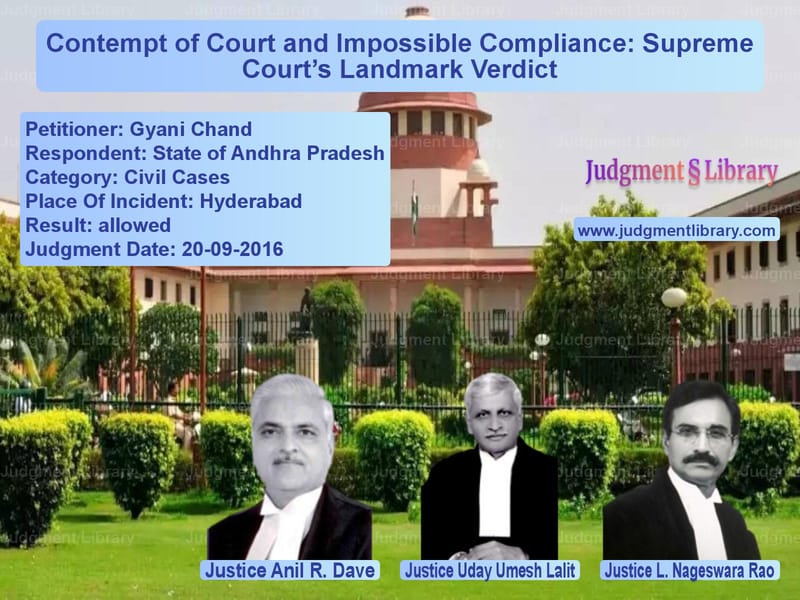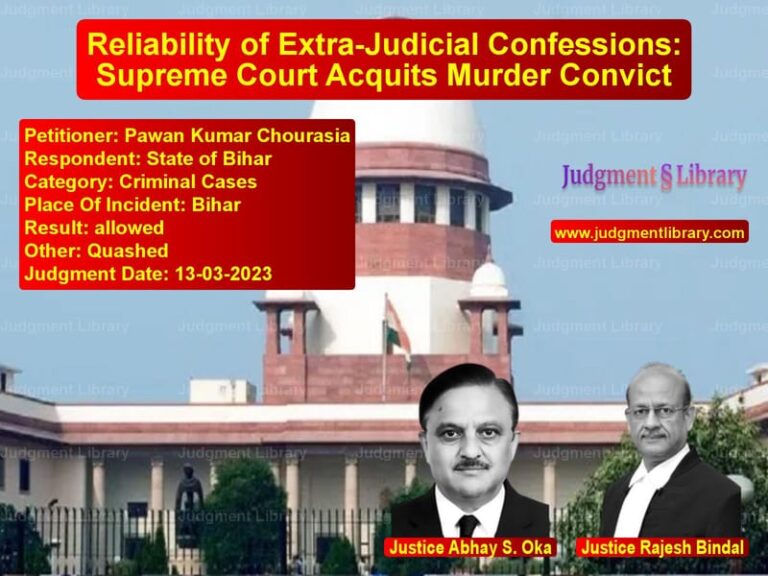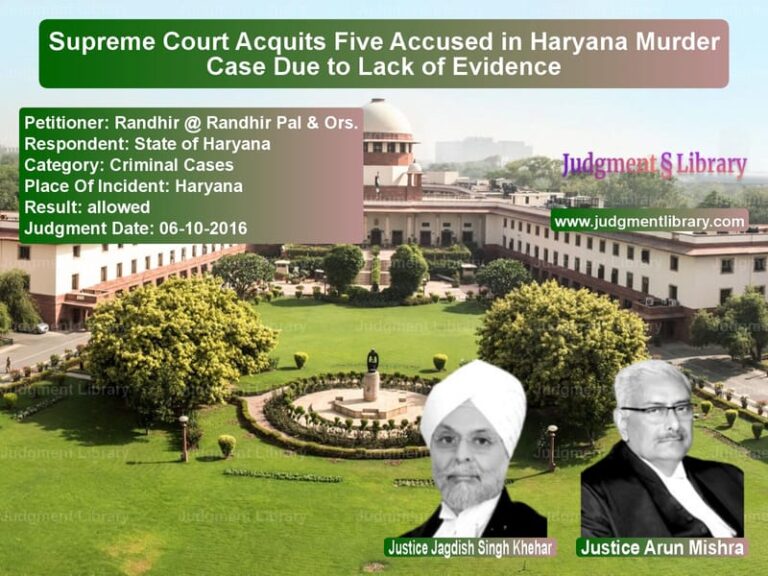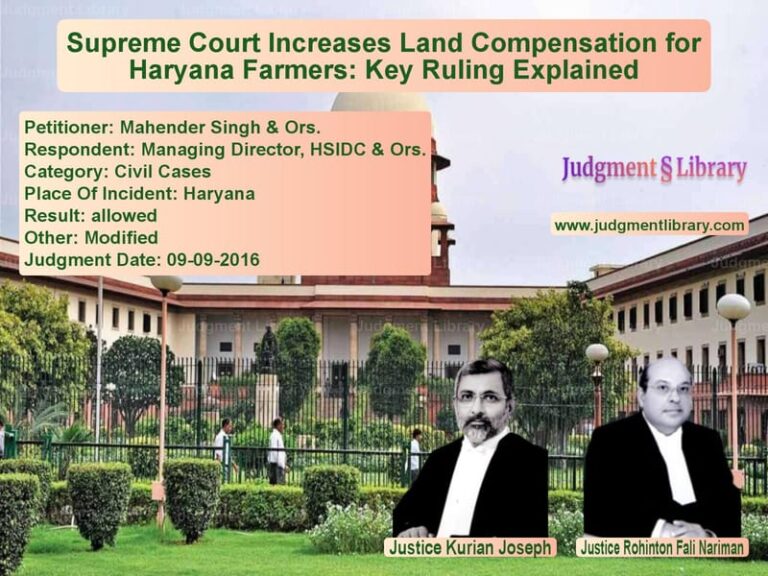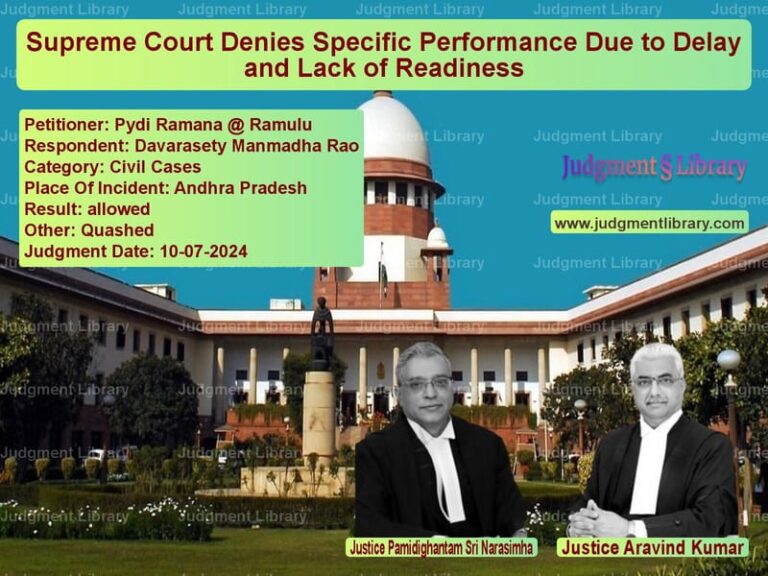Contempt of Court and Impossible Compliance: Supreme Court’s Landmark Verdict
The Supreme Court of India delivered an important ruling in the case of Gyani Chand vs. State of Andhra Pradesh, addressing the principles of contempt of court and whether an individual can be punished for failing to comply with an order that is impossible to fulfill. This case sheds light on the necessity of wilful disobedience to constitute contempt and the legal protections available when compliance is beyond a person’s control.
Background of the Case
The case arose from a contempt proceeding initiated against the appellant, Gyani Chand, after he was unable to produce certain documents he had earlier taken on behalf of his mother, Late Sharda Bai. These documents were required in I.A. No. 632 of 2001 in O.S. No. 231 of 1972, a case pending before the IXth Junior Civil Judge, Civil Court at Hyderabad.
Previously, Gyani Chand had given an undertaking to the court in I.A. No. 11 of 1985 that he would return the documents whenever directed. However, after his mother’s demise and a natural calamity, he was unable to comply with this order.
Events Leading to the Contempt Charge
In 1981, Late Sharda Bai, the mother of the appellant, had been a litigant in the original suit and had submitted certain documents in court. Since she was aged and unable to personally retrieve the documents, she authorized her son, Gyani Chand, to take possession of them on her behalf.
When he collected the documents, he gave an undertaking to the court, stating:
“I will return the documents on an undertaking to produce them whenever directed.”
Years later, the documents were required in another legal proceeding. However, by then:
- His mother, Late Sharda Bai, had passed away on June 2, 2004.
- She had filed an affidavit in a related legal proceeding, confirming that she was the rightful owner of the documents and that her son had merely collected them on her behalf.
- Gyani Chand claimed that the documents had been destroyed due to a severe cyclone and subsequent flooding in 1999, which caused his house, made of mud and asbestos, to collapse.
Despite this, the High Court found him guilty of contempt, sentencing him to one week of simple imprisonment and a fine of Rs. 2,000.
Supreme Court’s Intervention
Gyani Chand challenged the High Court’s ruling before the Supreme Court, arguing that he had no control over the loss of the documents and that punishing him for an impossible task was unjust.
The Supreme Court focused on whether the appellant had committed civil contempt as defined under Section 2(b) of the Contempt of Courts Act, 1971, which states:
“Civil contempt means willful disobedience to any judgment, decree, direction, order, writ, or other process of a court or willful breach of an undertaking given to a court.”
Key Arguments Presented
Arguments by the Appellant (Gyani Chand):
- He had no intention of committing contempt as he had handed over the documents to his mother, who was the rightful owner.
- The documents were lost due to a natural calamity, making their production impossible.
- The legal proceeding in which the documents were required was initiated by his relatives to pressurize him over family disputes.
- Punishing a person for failing to comply with an impossible task is unfair and violates the principles of natural justice.
Arguments by the Respondent (State of Andhra Pradesh):
- The appellant had given a clear undertaking to the court and was therefore duty-bound to return the documents.
- Even if the documents were lost, he should have informed the court immediately rather than waiting until contempt proceedings were initiated.
- The loss of documents should not be an excuse to disregard court orders.
Supreme Court’s Key Observations
The Supreme Court carefully analyzed the facts and legal provisions before concluding that contempt of court requires wilful disobedience, which was absent in this case.
The Court stated:
“There is no willful breach of the undertaking given to the court by the appellant, for which he can be held guilty of committing contempt of the Court.”
The Court further noted that:
- Since the documents were lost due to floods, it was physically impossible for the appellant to return them.
- His mother had already admitted in an affidavit that she had taken the documents from her son.
- Contempt laws cannot be used to punish individuals for circumstances beyond their control.
The Court emphasized:
“It would not be fair on the part of a court to give a direction to do something which is impossible, and if a person has been asked to do something which is impossible and if he fails to do so, he cannot be held guilty of contempt.”
Final Judgment
Setting aside the High Court’s order, the Supreme Court ruled:
“The appellant was not guilty of committing contempt of court as there was no willful breach of the undertaking given to the court.”
The Court expressed its disappointment that the appellant had already undergone the one-week imprisonment imposed by the High Court.
It concluded:
“For the afore-stated reasons, we are not in agreement with the judgment delivered by the High Court and therefore, we set aside the same and allow the appeal with no order as to costs.”
Impact of the Judgment
This ruling reinforces the legal principle that:
- Contempt of court must involve a wilful act of defiance, not an inability to comply due to external circumstances.
- Courts should consider whether compliance is feasible before holding someone in contempt.
- Orders requiring compliance must be reasonable and not impose impossible obligations.
Conclusion
The Supreme Court’s verdict in this case provides clarity on the application of contempt laws, particularly in cases where compliance is beyond an individual’s control. It protects individuals from being punished unfairly for circumstances they cannot change and ensures that the principles of justice and fairness are upheld.
Don’t miss out on the full details! Download the complete judgment in PDF format below and gain valuable insights instantly!
Download Judgment: Gyani Chand vs State of Andhra Prad Supreme Court of India Judgment Dated 20-09-2016-1741883781490.pdf
Direct Downlaod Judgment: Direct downlaod this Judgment
See all petitions in Legal Malpractice
See all petitions in Judgment by Anil R. Dave
See all petitions in Judgment by Uday Umesh Lalit
See all petitions in Judgment by L. Nageswara Rao
See all petitions in allowed
See all petitions in supreme court of India judgments September 2016
See all petitions in 2016 judgments
See all posts in Civil Cases Category
See all allowed petitions in Civil Cases Category
See all Dismissed petitions in Civil Cases Category
See all partially allowed petitions in Civil Cases Category

